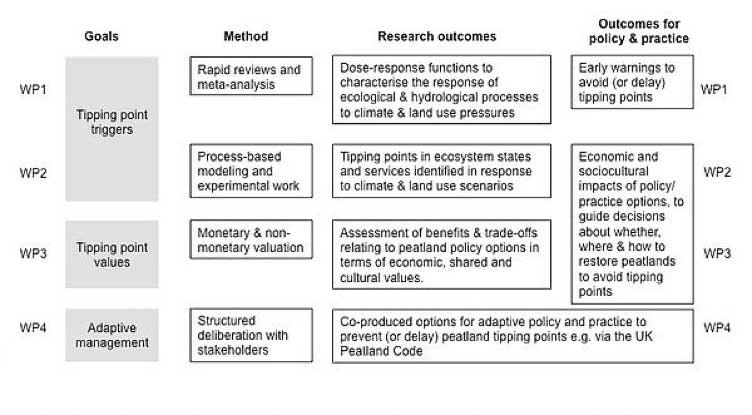Valuing Nature Programme - Peatland Tipping Points
The aim of this project is to use UK peatlands as a case system in which to understand how the combined effects of climate change and changes in land use and management (and other drivers, such as atmospheric deposition) are likely to trigger tipping points in the provision of ecosystem services.
The project will specifically consider tipping points for water quality, climate mitigation and cultural services including biodiversity, recreation, tourism and sense of place. The research will then assess the economic, social and cultural value of avoiding these tipping points versus reaching them, and we will use these insights to inform management and policy to enhance the resilience of natural systems to abrupt changes in future.
As the most extensive and well-understood peatland habitat, we focus on blanket bogs, which are the UK's single largest carbon stock. The project will produce research findings in three themes:
Triggers
The research will consider how changes in climate, land use and management might trigger regime shifts in in blanket peatlands to degraded states. It will consider the range of biophysical and social factors that may influence whether these shifts also trigger tipping points in the provision of ecosystem services over space and time. Where possible, we will identify early warnings that may indicate systems are heading towards tipping points.
Values
The research will assess the likely ecological, economic, social and cultural impacts of reaching tipping points in the provision of climate regulation, water quality and cultural services (including biodiversity) in blanket peatlands, and provide decision-makers with holistic evidence to guide decisions about whether, where and how to restore these habitats to avoid tipping points for specific ecosystem services
Adaptive management
Working closely with stakeholders, the research will consider how different forms of peatland restoration might move blanket peatlands from current degraded states to desirable new stable states that can adaptively sustain the provision of ecosystem services from peatlands under future climate change. Working in collaboration with the IUCN UK Peatland Programme, the owners of the UK Peatland Code, the projects will explore opportunities for private investment combined with existing agri-environment scheme to adaptively manage and avoid tipping points in peatland ecosystem services.

